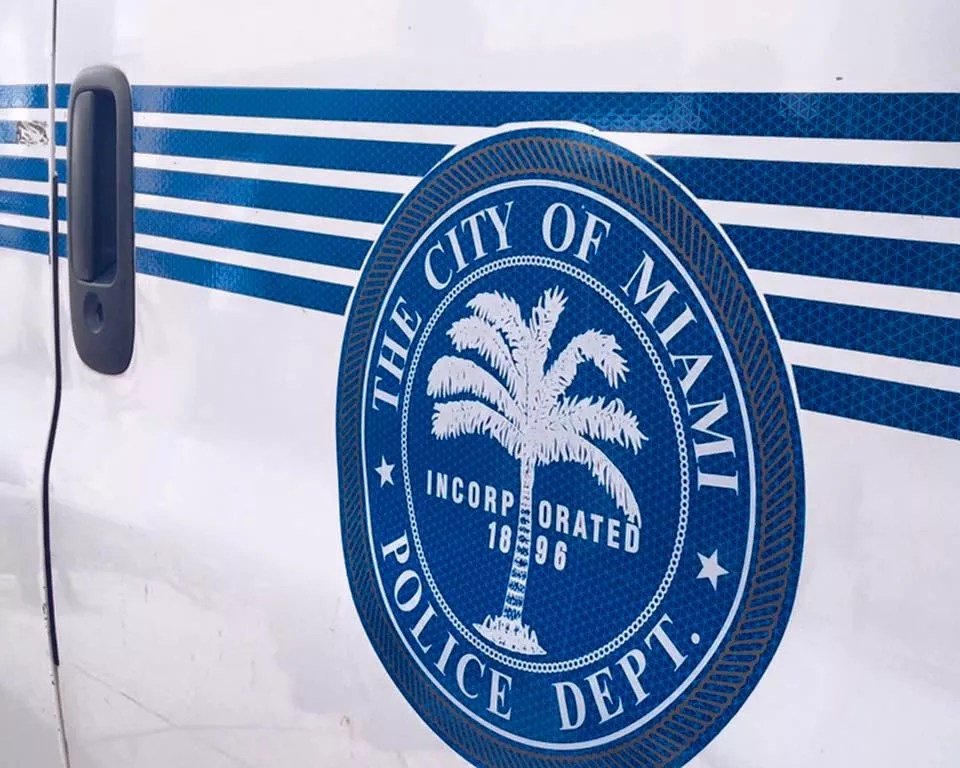
City of Miami Police

Audio By Carbonatix
Ramon Bueno had a green light and was driving below the speed limit when Miami Police Officer Lucas Rodrigues ran a red light at double the speed limit and slammed his cruiser into Bueno’s car, killing the 71-year-old husband and father.
But prosecutors who declined to file criminal charges against Rodrigues turned some of the blame on Bueno, claiming he should have somehow yielded to the speeding cop.
“Bueno failed to react to the police lights and siren and had a duty to yield the right-of-way to Rodrigues,” says a closeout memo filed by Michael Horowitz and Ross Weiner, the Broward County assistant state attorneys who handled the case because Bueno’s daughter works for the Miami-Dade State Attorney’s Office.
The two prosecutors cited a state statute that requires drivers to clear any intersection occupied by an emergency vehicle and to proceed only after it has passed. Yet it’s unlikely Bueno knew the police car was approaching: Red-light camera footage obtained by his family’s attorney and provided to New Times shows he had a solid green light when he drove through the intersection. Rodrigues, meanwhile, was accelerating when he ran the red light — an apparent violation of Miami Police Department policy.
Attorney Rick Freedman, who is representing the Bueno family in a wrongful death lawsuit against the officer and the City of Miami, says it’s clear Bueno wasn’t the one in the wrong. Bueno acted reasonably, Freedman says, while Rodrigues acted with “extreme negligence” that resulted in Bueno’s death.
“It’s rare that one gets to see such a clear example of gross negligence as is depicted in this video,” Freedman says in an email. “The Bueno family deserves justice in this case, and that is why they filed the lawsuit against the City of Miami.”
The crash happened in the early-morning hours of June 17, 2017, the day before Father’s Day, at the intersection of SW 12th Street and SW Seventh Avenue. Bueno was on his way to church to pick up food for the homeless, a routine of his. Rodrigues was one of several officers dispatched to a fight involving gang members and a stabbing, according to the prosecutors’ memo. His cruiser’s lights and siren were on.
Video footage shows that in the 18 seconds before Rodrigues reached the intersection, another officer — Wilfred Perez — slowed to less than 20 mph as he traveled through intersection on the red light. The light had been red for 38 seconds when Rodrigues went blazing through it. A crash expert hired by prosecutors, Bill Wright, determined that meant it was “unlikely” the officer noticed the light was red.
“Wright summarized that while Rodrigues was performing a complex task, he never recognized that his traffic signal was red,” the closeout memo says.
Rodrigues was accelerating as he entered the intersection, reaching 60 mph in the 30 mph zone. A second before colliding with Bueno’s Honda, he took his foot off the gas and braked hard enough to activate the antilock brakes. But his reaction came too late. His cruiser hit Bueno’s driver-side door at a speed of 53 to 58 mph. The two cars spun out and hit a third car that was stopped at the light.
State law says that while responding to an emergency call, officers may proceed through a red light “but only after slowing down as may be necessary for safe operation” and may exceed the speed limit but only “so long as the driver does not endanger life or property,” the closeout memo notes. Rodrigues didn’t slow down, and he obviously endangered life. But the prosecutors claim his “response and acceleration were in a measured way.” They go on to say the cop’s actions don’t constitute recklessness, which they’d need to prove in order to convict him of vehicular homicide.
“Officer Rodrigues’ actions that night may have been careless or negligent,” the prosecutors wrote, but “they did not rise to the level of recklessness to support criminal charges in this case.”
Rodrigues’ actions, at the very least, seem to have violated MPD policies. A copy of the agency’s departmental orders says officers should not break the speed limit by more than 15 mph unless “circumstances exist that would provide for the safe operation of the emergency vehicle at higher speeds and the gravity of the situation warrants it.” It also says that while approaching intersections, officers should reduce their speed and not proceed “until all traffic has yielded the right of way to the police vehicle.”
Yet two years after the accident, the internal affairs case is still dragging on. The Civilian Investigative Panel (CIP), an independent body that investigates allegations of police misconduct in Miami, says it has extended its review of the incident to wait for the police department’s findings. MPD told the CIP that Rodrigues was “relieved of duty/reassigned” June 20, 2017, but it’s unclear if that was due to the crash. It’s also unclear if he remains in that status.
Meanwhile, Freedman says, Bueno’s death has been devastating to his wife of 41 years and to their daughter. He says Bueno was outgoing and friendly, a jokester who loved to dance. During his retirement, he spent time volunteering and gave food to the homeless every weekday. The family was disappointed in prosecutors’ decision, Freedman says.
“They were clearly disappointed, but they respect the system,” he says. “They understand that there’s two systems: the criminal justice system and the civil system. And our case is now proceeding through the civil system, and we will attempt to get justice that way.”